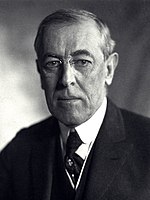1916 United States presidential election
33rd quadrennial U.S. presidential election
The 1916 United States presidential election was the 34th election in the history of the United States. It occurred on November 7, 1916. This election was between Incumbent President since 1913, Woodrow Wilson from New Jersey and former Associate Justice of the Supreme Court from New York Charles E. Hughes. Wilson won the election by a close margin gaining 277 electoral votes. Charles E. Hughes got 254 electoral votes.
| |||||||||||||||||||||||||||||
531 members of the Electoral College 266 electoral votes needed to win | |||||||||||||||||||||||||||||
|---|---|---|---|---|---|---|---|---|---|---|---|---|---|---|---|---|---|---|---|---|---|---|---|---|---|---|---|---|---|
| Turnout | 61.8%[1] | ||||||||||||||||||||||||||||
| |||||||||||||||||||||||||||||
File:ElectoralCollege1916.svg Presidential election results map. Blue denotes states won by Wilson/Marshall, red denotes those won by Hughes/Fairbanks. Numbers indicate the number of electoral votes allotted to each state. | |||||||||||||||||||||||||||||
| |||||||||||||||||||||||||||||
This election was the closest for any President since the election of 1876 between Rutherford B. Hayes and Samuel J, Tilden. If Hughes had won either California or Missouri, he would have become the 29th President.
Candidates
changeRepublican Party
change- Charles E. Hughes, Associate Justice of the Supreme Court of the United States from New York (1910-1916) (Nominee)
- John W. Weeks, Senator from Massachusetts (1913-1919)
- Elihu Root, Former Senator from New York (1909-1915)
- Theodore Roosevelt, 26th President of the United States from New York (1901-1909)
- Robert M. La Follette, Senator from Wisconsin (1906-1924)
- Albert M. Cummings, Senator from Iowa (1908-1926)
- Theodore Burton, Former Senator from Ohio (1909-1915)
- Charles W. Fairbanks. 26th Vice-President of the United States from Indiana (1905-1909) (Vice-Presidential Nominee)
- Martin G. Brumbaugh, Governor of Pennsylvania (1915-1919) (Favorite son Candidate)
- Lawrence Y. Sherman, Senator from Illinois (1913-1921) (Favorite son Candidate)
- Henry Ford, businessman, industrailist, peace activist, and philanthropist from Michigan (1891-1945) (Favorite son Candidate)
Democratic Party
change- Woodrow Wilson, 28th President of the United States (1913-1921) (Incumbent) (Nominee) (Unopposed)
References
change- ↑ "National General Election VEP Turnout Rates, 1789-Present". United States Election Project. CQ Press.

